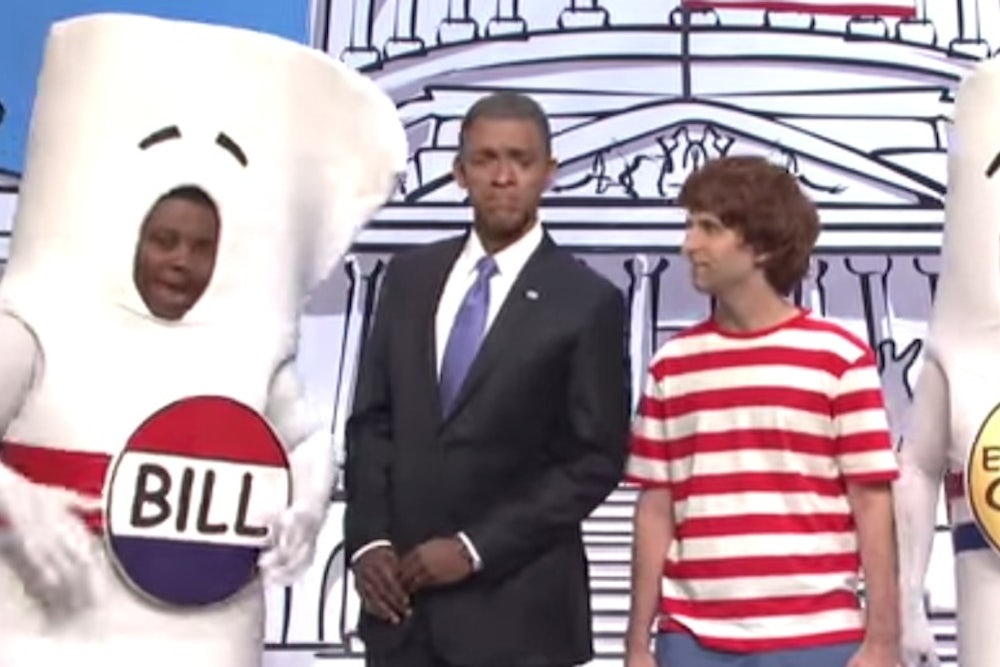President Obama’s executive order on immigration was the big topic on the weekend shows. And I don’t just mean the ones that run on Sunday morning.
“Saturday Night Live” opened with a spoof of the old “I’m Just a Bill” cartoon from Schoolhouse Rock. Just as Mr. Bill is explaining how he’s supposed to become a law, President Obama comes along, pushes him down the steps of Capitol Hill, and introduces his new friend—Mr. Executive Order. “You see son, there’s an even easier way to get things done around here.”
If you haven’t seen the video yet, it’s worth watching. It's clever and funny, although, to be fair, it doesn't get the policy details quite right.
The video suggests that Obama’s executive order gives legal status to as many as 5 million undocumented workers. It doesn’t. It merely gives them a temporary reprieve from deportation and the opportunity to get working papers—and, even then, only if they apply, pay a fee, and pass background checks. (Claire Groden has a rundown of the process at QED.) Obama’s successor could undo the order just as unilaterally, and as quickly, as Obama did. That is one reason that most lawyers, including many conservative lawyers, think the action is plainly constitutional.
But the harder question has always been about the unwritten rules of politics, not the written ones. By acting on his own, so soon after his party suffered a defeat in the midterm elections, has Obama violated previous understandings of what a president should and shouldn’t do? Will it create a precedent that future presidents can exploit, quite possibly for purposes that liberals will regret?
Two recent articles provide two very different perspectives on that question. One, by Eric Posner, appears at the New Republic. Its thesis is that Republicans should actually celebrate Obama’s decision, even though they oppose what he’s trying to do on immigration, because Republicans can do more with a powerful executive than liberals can. As Posner sees it, presidential discretion largely means the ability not to enforce a law—or, at least, to enforce it lightly. And while immigration laws are the type that liberals might not love, Posner says, there are many more that Republicans would want to subvert:
the great bulk of federal law is liberal economic regulation, not conservative morals regulation. A conservative president can refuse to enforce laws, but a liberal president can’t enforce laws that don’t exist. While a President Rand could gut the regulatory state, the opportunities for a President Hillary Clinton to advance liberalism through non-enforcement are much less fecund.
Posner is probably right that, over the long run, conservative presidents can take more advantage of executive authority than liberal presidents can. But it’s a lot less clear whether Obama has truly expanded conventional understanding of executive authority.
Writing at Vox, Andrew Prokop considers three issues on which a future Republican president might be inclined to go easy on enforcement—taxes, environmental regulations, and Obamacare. On all three, Republican presidents have already used their authority to subvert legislation’s intention. A classic case was the way President George W. Bush's Administration weakened estate tax enforcement—by reducing staff and ordering fewer audits. Prokop, citing a New York Times story, notes that a tax lawyer once described these efforts as a “back-door way for the Bush Administration to achieve what it cannot get from Congress, which is repeal of the estate tax.”
Who’s right? It's not an easy call, but I'm inclined to agree with Prokop. And having watched Republicans eviscerate so many other governing norms—by routinely blocking presidential appointments, for example, or using the debt ceiling as a tool of political extortion—I'm not sure the old traditions even mean so much anymore. The answer will ultimately depend in part upon public perceptions of presidential power—and whether Obama's decision changes them. The writers at SNL seem to think they will. I guess we’ll have to wait and see how many people agree.
—Jonathan Cohn
News
BENGHAZI A two-year investigation by House Republicans found no evidence of a conspiracy, cover-up, or other attempts to mislead the public. In other words, there was no scandal. (Kevin Drum, Mother Jones)
CHILD CARE Obama last week signed a bill that will tighten up safety regulations, and increase inspections, for federally subsidized day care centers. An editorial in the New York Times calls it an important step forward for improving access to quality child care—though still just one step.
Articles worth reading
A campus rape and a conspiracy of silence: A harrowing, infuriating feature story by Sabrina Rubin Erderly tells the story of a University of Virginia student who was gang raped at a fraternity party—and then faced a hostile campus culture and largely indifferent administration as she thought about pursuing justice. Following the article’s publication, university administrators suspended all fraternity social activities until January, while an investigation is underway. (Rolling Stone)
The Cosby show: Ta-Nehisi Coates reflects on the past failure of journalists, including himself, to deal with allegations of rape against Bill Cosby. (The Atlantic)
Immigration’s political winners. Jonathan Chait says Obama’s announcement, and the predictable hostility it provoked from conservatives, will solidify the Democrats’ image as the party of compassion and inclusion. (New York)
At QED
Danny Vinik explains why the new executive action is good for American workers, but warns that it might lead to another government shutdown. Rebecca Leber describes the furious GOP reaction to an upcoming EPA rule. And Brian Beutler investigates whether Obama really did shred the Constitution and flush it down the toilet, as Rush Limbaugh claims.
